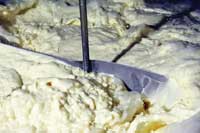Farmers warned over clone-derived milk

Dairy companies are warning farmers that milk from the offspring of cloned cows must not be sold for human consumption.
Producers face prosecution unless they ensure milk from clone-derived animals is kept out of bulk tanks, said dairy processors.
The warning came after an unnamed British farmer told an American newspaper he was selling milk from the offspring of a cloned cow.
It has since emerged that almost 100 animals have been born in Britain to eight cattle imported as embryos from a prize-winning American cow.
The Food Standards Agency said there was no risk to public health from milk produced from clone-derived cows.
But it considers milk from cloned offspring to be “novel foods” which must be authorised before being placed on the market.
The agency said it had received no such applications.
“The agency would like to remind food business operators of their responsibility to ensure food they produce is compliant with the law,” it said in a statement.
The penalty for failing to comply with novel food regulations was a fine of up to £5000, the agency added.
The situation has triggered warnings to farmers from dairy processors, including First Milk, the UK’s largest dairy farmer-owned business.
“If you have clones or the offspring of clones it is therefore not legal to include this milk in your milk supply,” said First Milk.
“If you have such milk, this must be kept out of your supply with immediate effect,” it warned in a letter to farmers.
Producers who failed to comply would be liable for any costs incurred through the disposal of milk or dairy product, said First Milk.
“Please note that the potential costs involved in either milk or products having to be destroyed could be substantial.”
A similar statement was issued by Arla Foods, which sells 165m litres of milk worth almost £120m a year through the Cravendale brand.
“It is illegal to include the milk from clones or their offspring in milk that is supplied to Arla Foods,” the company said.
“This milk would therefore need to be excluded from the bulk tank.”
Graham Jack, of Robert Wiseman Dairies, suggested his company would go even further.
Dairy processors would be reluctant to purchase clone-derived milk even if it were legal, he indicated.
“Where it starts and ends with us is the need to meet the requirement of the customer,” said Mr Jack.
“Whether a licence is granted or not, the question of acceptability remains.”
Read more on this story
• Watchdog leaves farmers crying over cloned milk
• Cloning row: The eight embryos – what happened to them?
• Cloning investigation finds second bull in food chain
• Clone-derived meat has entered food chain – FSA
• FW’s bid to bring balance to cloning debate
• Food watchdog: No risk from ‘cloned milk’
• Milk from cloned cow offspring ‘went down the drain’
• No risk from ‘cloned milk’, claims industry
• Milk from cloned cow’s offspring ‘on sale in Britain’
